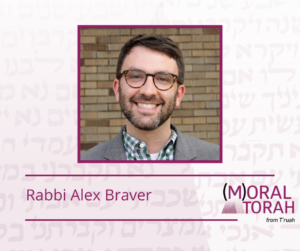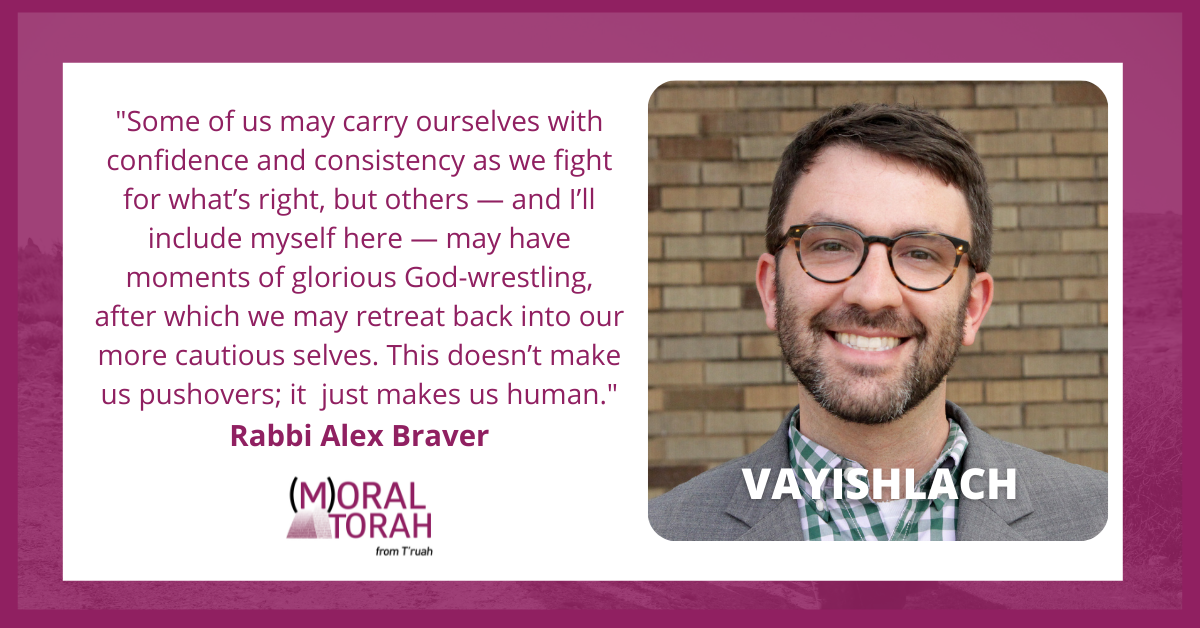A D’var Torah for Parshat Vayishlach by Rabbi Alex Braver
As a congregational rabbi, I have to admit that I often feel the inclination to hedge my bets when it comes to confronting big issues.
The name T’ruah connotes the piercing call of the shofar, cutting through the noise with a clear and powerful sound that awakens us to truths we need to hear. And don’t get me wrong, there are times when I feel like I’m channeling the shofar, awakening sleepers to important truths. But more often than not, when it comes to speaking out on controversial issues, I feel uncomfortably torn. Sometimes, it comes from my own ambivalence and confusion, while other times it comes from a desire to keep the peace, avoid confrontation, or just a selfish fear of sticking my neck too far “out there.”
I’d imagine I’m not the only rabbi who feels that way…and I know for sure that I’m not alone as a person who hates conflict and will do almost anything to steer clear of it.
Sign up to receive (M)oral Torah in your inbox each week.
That might be the reason why Jacob appeals to me so much as a character. He avoids direct confrontation and commitment, preferring to scheme and dissemble. His fear is readily apparent. When his mother Rebecca confidently plans to have him snatch the blessing reserved for his brother Esau, Jacob expresses doubt and hesitation. Later, on the run from his brother’s murderous revenge, his response to a vision from God is to put forward a quid-pro-quo:
If God remains with me, if God protects me on the journey that I am making, and gives me bread to eat and clothing to wear, and if I return safe to my father’s house — the ETERNAL shall be my God. (Genesis 28:20-21)
He remains caught between his two wives’ feuding, unable to effectively or empathetically resolve their disputes. He tries to sneak off from Laban, his father-in-law and employer, rather than decisively confront him over years and years of resentment and cheating.
Now, finally, Jacob is on the verge of a confrontation two decades in the making. Fleeing Laban, he returns home to the Promised Land, where he once fled from his brother’s wrath. There, finally, Jacob is pushed into his greatest and most well-known confrontation, as he wrestles with a mysterious figure through the night. Though the “man” wrenches his hip in the scuffle, Jacob grapples him to a stalemate, securing a blessing and a new name — Israel, or “God-Wrestler.”
Find more commentaries on Vayishlach.
After such a dramatic, climactic struggle, one might expect Jacob to have a change of heart — to have learned to confront challenges boldly and with confidence, to stop trying to weasel out of everything that comes his way. Yet when Jacob hears that his brother approaches with 400 men, he divides up his camp, with his handmaids and their children first, then Leah and her children, and finally the most beloved Rachel and Joseph in the rear — presumably to give them the greatest chance at escape if things go south. Luckily, Esau greets Jacob with tears in his eyes and plants a kiss on his neck — no need for this contingency plan. But still, the wily Jacob hasn’t quite been fully replaced by the confident God-Wrestler Israel.
To me, Jacob feels human for his fearfulness — and even more human for his backsliding. Some of us may carry ourselves with confidence and consistency as we fight for what’s right, but others — and I’ll include myself here — may have moments of glorious God-wrestling, after which we may retreat back into our more cautious selves. This doesn’t make us pushovers; it just makes us human.
 And yet, the angel identifies Jacob’s truest name, his real essence, as “Israel” the God-Wrestler. Despite his dissembling and his hedging, it is when he is grappling with all his might for a sacred purpose that he is living out his true divine purpose. No amount of slinking back to his trickster ways can erase who he now knows he ought to be.
And yet, the angel identifies Jacob’s truest name, his real essence, as “Israel” the God-Wrestler. Despite his dissembling and his hedging, it is when he is grappling with all his might for a sacred purpose that he is living out his true divine purpose. No amount of slinking back to his trickster ways can erase who he now knows he ought to be.
When I think about who I want to be in the world as a person, a Jew, and a rabbi, I know that I contain both Jacob and Israel within me. But I try to remember that it is Israel — the God-Wrestler — that represents my most fully-realized self.
Rabbi Alex Braver is the Associate Rabbi at Congregation Tifereth Israel in Columbus, OH, where he works with families and people of all ages to foster joyful and meaningful Jewish life. He lives with his husband and son.

